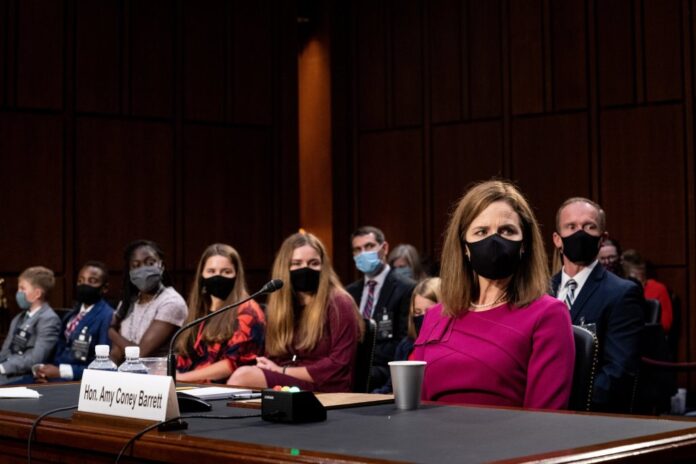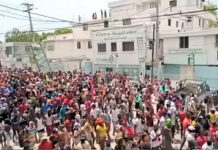
As confirmation hearings for Judge Amy Coney Barrett, begin this week, legal and immigration experts look on with much concern.
Immigration has not come up yet for President Donald Trump’s choice to replace Justice Ruth Bader Ginsburg on the Supreme Court, but Republicans are eager to push through Barrett’s nomination. With her appointment all but confirmed to many observers, the Supreme Court will have a permanent 6-3 leaning for conservatives for the foreseeable future.
“The stakes for immigrant communities have never been higher,” said Murad Awawdeh and Rovika Rajkishun, interim Co-Executive Directors of the New York Immigration Coalition in a joint statement. “A shadow of uncertainty will, once again, descend on Dreamers, and the rights of immigrant communities will be under siege for a generation.”
Regardless of who wins the November election, dozens of cases that could impact the lives of Haitian immigrants are likely to make their way to the Supreme Court.
Here’s a look at the top issues that have immigrant advocates worried about a Barrett appointment, based on how she has ruled on them in the past.
The Public Charge Rule
The White House’s recent “public charge” rule gives immigration officials more leeway to deny visas to anyone they believe will use certain government resources — making them a so-called “charge” on the public.
Nicole Phillips, Legal Director for the Haitian Bridge Alliance, points to Barrett’s involvement in a case related to the public charge rule in Illinois. In that case, Cook County v. Wolf, the three-judge panel voted in favor of immigrants, but Barrett wrote a scathing dissent. In it, Barrett criticized justices and said the government should be allowed to deny people visas based on a set criteria.
Concerns over the public charge rule have become even more important during the COVID-19 pandemic. Some Haitian immigrants whose status is being adjusted were unsure whether to use public health services for coronavirus tests or take part in any government efforts to help people financially during this period of massive economic distress, Phillips said.
“This has a huge implication for Haitians who are applying for an H1, H2 visas or who are trying to adjust their status to get their green cards, [because] it’s all very confusing whether this would be considered a public charge,” Philips said.
Asylum Applications And Removal Proceedings
Phillips, who works with hundreds of Haitians caught up in the immigration system, explained that when someone files for asylum or is put in removal proceedings, generally the immigration court will issue a ruling and the applicant has a right to appeal it. That appeal bypasses the district court and goes directly to the circuit court, where Barrett spent years.
“These cases were going to her and she denied most of those cases for review that she received,” Phillips said. “The fact that she didn’t review these cases and upheld all of the immigration court decisions doesn’t give a fair right of appeal to asylum seekers.”
DACA
One of the biggest immigration issues facing the court revolves around programs designed to help legalize immigrants who may have been undocumented. For years, Republican lawmakers have sought to take down programs like DACA and TPS through the courts.
In June, the Supreme Court voted 5-4 to uphold the DACA program, which shields immigrant youth from deportation, and allows them to go to school and support their families, Awawdeh and Rajkishun noted.
Fewer than 100 Haitians are in the United States through DACA, but if another court battle ensues, they would be affected.
TPS
Currently, Temporary Protected Status (TPS) is making its way through the court system that would affect nearly 400,000 people, including Haitians. With it came a family reunification law that has ended.
In addition to the larger court case for all TPS holders, a separate battle is underway specifically to protect Haitian TPS holders. In Saget v. Trump, immigration advocates cite Trump’s long history of public comments as proof his decision to end TPS is racially motivated and unfair.
Republican leaders have defended Barrett from criticisms of her controversial judicial record, pointing to her two adopted children from Haiti as evidence of her good nature.
But immigration experts and lawyers have said that her adoption of two children from another country has had little effect on her rulings related to immigration and Haitians. What matters is her record and views on the law, they said.
“What she tends to do in her rulings is she really defer to administrative agencies,” Phillips said. “That is problematic if, for any policy that the Trump administration promulgates, there is going to be this inference in her judgment that those are correct and should stand.”
This article was first published on The Haitian Times website.











